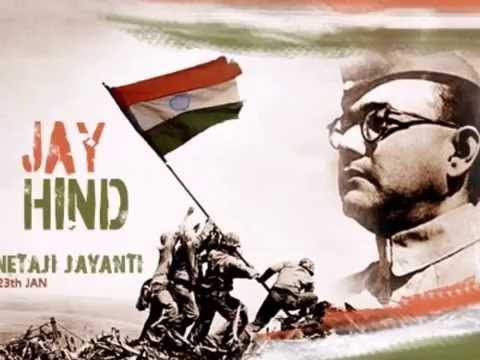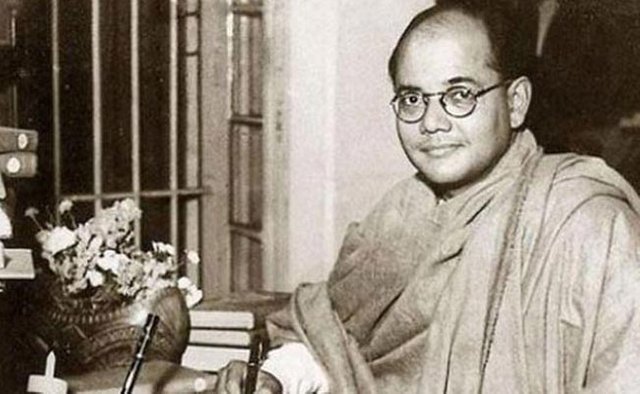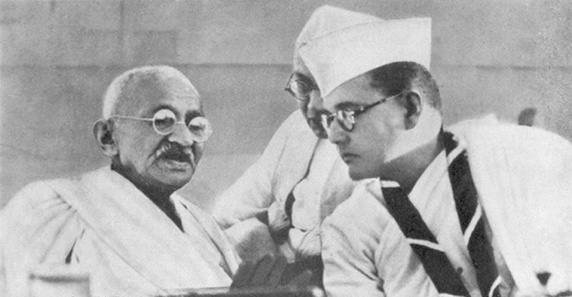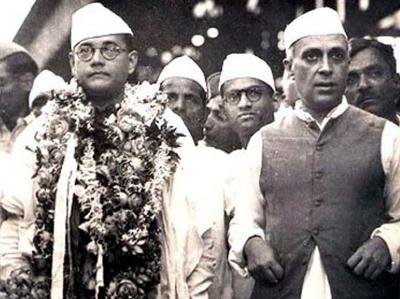The struggle of Ajad Hind Fowz
When Subhas Chandra Bose started his political career, he was in complete support of swaraj. He wanted nationalism in his country. According to him, nationalism could only help Indian society to expand. Different features added to his political idealism. He desired to share German nationalism of twentieth century. Simultaneously, he allowed the ideal economic equality of Soviet Russia. Swami Vivekananda’s organizational ideas inspired him a lot.

When Subhas Chandra Bose joined politics, the general people of India were taking part in several movements under the command of Gandhi.
The role of common people was being set up in Indian politics, apart from what conception of upper class had about them. However, Subhas Chandra Bose had never supported Gandhi’s non-violent principle, but he accepted him as his leader.
Subhas had a new job to extend twentieth century Indian politics. During this period he exchanged many letters with Chittoranjan Das, Bengal leader. Subhas joined Bengal politics under Chittoranjan’s leadership instead of Civil Service. He was appointed the editor of Bengal Congress propaganda department as well as principal of a national college. He went to jail too because of his involvement in Civil Disobedience movement.

Subhas Chandra came to know about Chittoranjan’s political conceptions, when he was in jail. So he was very much impressed with his thought and work. He was also holding the secretary’s post to swarajya party established by Motilal Nehru and Chittoranjan. Being joined swarajya party he held the editor’s post of Forward newspaper. In 1924, the party became successful to win the Calcutta Corporation election and Chittoranjan became the Mayor of city. Subhas Chandra was assigned the chief executive’s job. Many free schools and charity health centers were established during this period with the help of Corporation. He started many enterprises for the advantage of Islamic society, so that the distance between Hindu and Muslim society could be end. During this period, Subhas was held in prison frequently.

In 1925, when Chittoranjan was died, Subhas started propagating complete swaraj himself. He disallowed the federal system, a proposal of the British government. It started a confliction between Gandhi and Subhas in 1928 during the Calcutta session of the Congress.
Subhas Chandra was sent to jail soon after Civil Disobedience began in 1930. He then became sick and went to Europe for his treatment, where he came in contact of Benito Mussolini who was the head of state, Italy. In 1932 Subhas was interested in Mussolini anti-corruption and social welfare programmes. Due to exclusion of Civil Disobedience in 1933, Subhas strictly condemned the Congress policy.

In 1930, when the Congress party began to crack, a lot of difference in opinion, regarding agitation, socio economic ideas, started to grow between the new and old leadership. Young leaders like Jawaharlal and Subhas showed the need of a revolutionary programme, so that the youth could take part in freedom struggle and in making India as an independent country. Major confliction was seen within the Congress regarding their role in freedom struggle and running provincial government. This unpleasant incident increased the influence of the upper level of leadership. However the common people were not happy with Congress. Gradually the membership of Congress began to decline. Huge dissatisfaction among the people became the main reason of mass revolt. Quit India movement of 1942 was one example of this revolt.
By this period, Second World War had begun. Subhas thought that German would defeat England. So he planned to make pressure on the British government to leave India. In 1942, in Singapore, Azad Hind Fowz was established by Rashbihari Bose. Most of the members of Azad Hind Fowz were taken from the Indian soldiers who served for British army and were jailed during the war in Japan. On the request of Rashbehari, Subhas went to Japan and took control of Azad Hind Fowz. Many Indians joined Azad Hind Fowz, in which 40 thousands were Indian prisoners of war and the rest of them were from south-west Asia. On 22nd October, 1943, establishing the Azad Hind or war term government of independent India, Subhas became the Prime minister and the commander–in-chief of the army.

In November, Tojo, the Prime Minister of Japan, handed the control of Andaman and Nicobar islands, occupied by Japan, to Azad Hind Fowz.
On 4th February, 1944, the first regiment of Azad Hind Fowz began moving from Rangoon towards India. On 19th March, 1944, they became successful to hoist the national flag in India, and then took over the control of Kohima in the month of April. However, two battalion of Azad Hind Fowz were defeated in the Imphal campaign. In the meantime, Japan had to move their army from Burma border to Second World War regions. As the monsoon started, all communications system was disrupted and food supply was stopped. Many armed forces were died because of malaria disease and the cold. There were many obstacles which stopped the function of Azad Hind Fowz.

Nevertheless, Subhas was too confident that he would revive Azad Hind Fowz again. He hoped that Soviet Russia would help him. With the help of Japanese government, Subhas reached Manchuria which comes on the way to Russia. On 18th August, 1945, it was believed that Subhas Chandra Bose had died in an accident occurred at Taihoku airport in Taiwan. But the people still have doubts regarding this matter.
Though Azad Hind Fowz expedition had finished, it influenced Indian politics a lot. To interrogate the soldiers of Azad Hind Fowz after they surrendered, they were taken to India. P.K. Sehgal, G.S. Dhillon and Shanawaz Khan were found guilty among them in their trail at Red Fort, Delhi.

Azad Hind Fowz got donation from many soldiers. In February 1946, the Royal Indian Navy publicly announced a great revolt against the British government. Then the British government could understand that they left few days in India.
Good job o the writing, thanks for sharing this piece of political history with us. All for one and one for all! Namaste :)